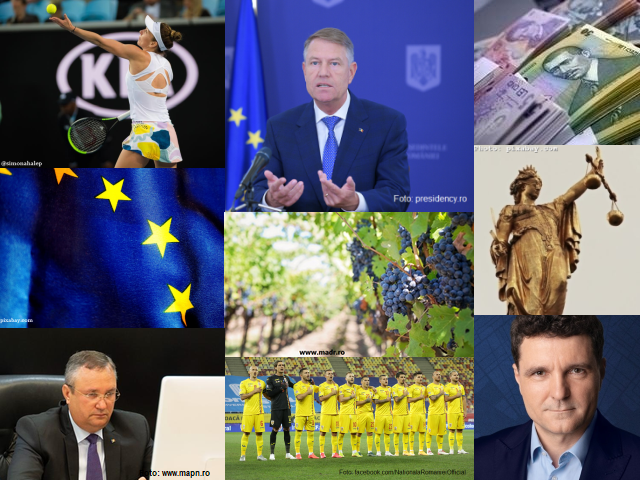THE WEEK IN REVIEW
April 24-28 2023

Bogdan Matei, 28.04.2023, 14:00
Negative for Schengen
Austria cannot commit to a set date for supporting Romania in joining the Schengen free circulation space, because it does not work. This was the conclusion of the visit paid by Conservative Interior Minister Gerhard Karner on Thursday to Bucharest, meeting his Romanian counterpart, Lucian Bode, in what was supposed to be a gesture to unfreeze bilateral relations. That did not happen. Meanwhile, Croatia joined the Schengen space on January 1, 2023. In December 2022, the ministers of interior of member states, meeting in Brussels at the Council of Justice and Internal Affairs, endorsed the membership of the ex-Yugoslav republic in the free circulation zone applying to 400 million EU citizens, even as the country had joined the EU in 2013. At the same time, Romania and Bulgarias candidacy was rejected, although they have been EU members since 2007. Austria voted against them, and The Netherlands used their veto against Bulgaria. Back then, President Klaus Iohannis said that Austrias regrettable and unjustified attitude risked affecting European unity and cohesion, which was much needed, especially in that geopolitical context. The Romanian PM also expressed profound disappointment in the lack of consensus within the JAI Council. The opposition leader of the USR Party, Catalin Drula, also said that the decision was unjust, and called for Minister Bode to resign. The head of another main opposition party, the AUR, George Simion, called for the resignation of the entire Ciuca cabinet, and opined that the decision from Brussels is a resounding failure for Romanian diplomacy overall. Almost half a year later, nothing changed. Romania is still outside the free circulation space, and no one was dismissed in Bucharest, while Euroskepticism is on the rise.
Positive for South America
On Tuesday, Romanian President Klaus Iohannis wrapped up his one week South American tour in Argentina. The extended visit started in Brazil, where the head of state met his counterpart, Luiz Inacio Lula da Silva, and local officials in Rio de Janeiro. The two heads of state signed a joint declaration for developing bilateral relations in various areas. The Brazilian president said that, in addition to political and trade relations that his country has with Romania, human relations were also important, since over 40,000 Romanian origin citizens live in Brazil. The second stage of the presidential tour was in Chile, where Iohannis met president Gabriel Boric, agreeing on developing trade, investments, and other areas of cooperation. On this occasion, a memorandum was signed between institutions in both countries, some in charge of emergency management in situations such as earthquakes and forest fires. Also, Iohannis announced that the first advanced course in the Romanian language in Latin America would be set up this year at the Santiago de Chile University. In Buenos Aires, the president held talks with his Argentinian counterpart, Alberto Fernandez, with a view to enhancing bilateral political and diplomatic dialog. Two memorandums of understanding were signed, one for emergency situations, the other for farming research and environmental protection.
Trouble for the Romanian press
Romania is at the bottom of the list in terms of respecting and guaranteeing freedom and safety of the press, as well as unimpeded access to information of public interest. This was a statement from the NGO ActiveWatch, through its president, Liana Ganea. This statement comes after the EC vice-president in charge of values and transparency, Vera Jourova, had said that the situation of the press in Romania is not rosy, and there is a lot of room for improvement. The two said that the main problem is that the main political parties provide non-transparent financing to the press, which leads to reasonable suspicion that the public agenda as reflected in the media is distorted. At the same time, the few voices in the media that are critical of political power have become the target of smear campaigns, either by political actors, or by press institutions with a long history of ethical violations. Moreover, journalists are the target of threats, including death threats. In 2022, two court decisions doled out criminal convictions against people found guilty of threatening the safety of journalists. One of these decisions, which is still pending, was for planning the killing of a journalist, said Liana Ganea.
New rules for Ukrainian refugees
Starting on February 10, 2022, two weeks before the Russian armed forces invaded their country, over 4 million Ukrainian citizens entered the country. Most went on their way to the west of Europe, but over 100,000 chose to remain. The government in Bucharest decided that individuals who host refugees from Ukraine would get compensated for refugee living expenses only up until the end of this month. After this deadline, new provisions would apply, passed by emergency ordinance. Starting on May 1, people arriving to Romania from the conflict areas in Ukraine would receive a nominal amount of money for four months, meant to cover immediate needs. The money is meant to be doled out from the budget of the emergency situation inspectorate. After these four months, financial aid will only cover accommodation expenses, up until the end of the year. Refugees are encouraged to register with hiring agencies, in order to access all forms of assistance for jobs or unemployment. According to the press office of the government in Bucharest, these rules also apply to Romanian citizens.
Medals for wrestling
Trophy holders Sepsi OSK will contend Romanias football cup with Universitatea Cluj. In the finals, Sepsi defeated standing champions CFR Cluj by 3-0, while Universitatea defeated UTA Arad 1-0. Also in sports, Denis Mihai won the bronze medal in Greco-Roman wrestling at the European championships in Zagreb, Croatia. This is the only medal gained by Romania in the mens competition. The female delegation, on the other hand, had much better achievements: two gold medals, won by Andreea Ana and Alexandra Anghel, and two bronze, gained by Catalina Axente and Kriszta Incze.



























